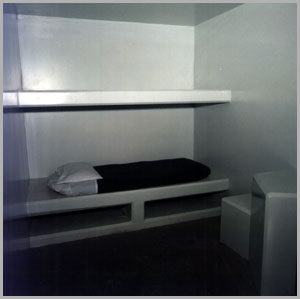|
Debriefing
Part 1 2 3 4
 | A cell in the Security Housing Unit (SHU) - courtesy California Department of Corrections |
Pelican Bay's Supermax is called the Security Housing Unit - the SHU. It's a concrete and steel structure that looks like a giant bunker. Inside, four guards are searching cells of alleged gang members. The guards are in green jump suits and stab-proof vests and carry truncheons and huge mace canisters. The prisoners are locked nearby in holding cages.
Guards tap the walls looking for hidden weapons. They comb through a jumble of envelopes, mail, legal documents and cardboard food containers. After about 20 minutes one guard makes a find.
"This is an address he was trying to conceal," says the guard as he holds a paper cup with two addresses tucked inside the lid. He hands them to Robert Marquez, Pelican Bay's chief gang investigator.
"They're drop addresses to conduct gang activity," says Marquez, "and he didn't want us to find them. We'll monitor mail going to those addresses."
The prisoner is an alleged member of a white supremacist group called the Aryan Brotherhood. Marquez suspects the inmate is using these addresses to get messages to other gang members in prison and on the streets. It wasn't the only cell where they found something.
"They're not just sitting around for 22 hours and watching TV," says Marquez. "They're studying, they're reading, they're educating themselves. They're looking for ways to beat us."
But officials hope they can use the SHU to beat the gangs. In Pelican Bay, inmates accused of gang membership are held in the SHU for the duration of their sentence. To get out, an inmate has to prove to prison officials that he's left the gang. In theory, he can do that by severing all contact with the gang. But he has to do it for six years and most gang members say that's impossible. The alternative is to take the quick way out. The inmate can agree to what's called "debriefing." In debriefing, a prisoner has to divulge everything he knows about the gang and even agree to testify against other members. In other words, if he doesn't want to serve his whole term alone in a tiny cell, he has to become a snitch.
Several weeks after the cell searches, gang investigator Robert Marquez gives one inmate a choice: quit the gang and debrief or remain in the SHU cut off from almost all mail and visits.
"He decided at that point," says Marquez, "that he didn't want to be in the gang anymore and he chose to sit down with us for a three-and-a-half hour interview during which time we were able to find out about the Aryan Brotherhood, activities that they have going on in the Security Housing Unit, activities they have going on in the mainlines and activities they have going on in the streets."
The inmate had spent 12 years in the supermax. So why did he finally submit?
"Without no names, somebody found my soft spot," says the inmate with a laugh. "Everybody has a breaking point and they found it and used it to their advantage and it worked."
The inmate, who asked that his name not be used because of possible retaliation, explains that his soft spot was his girlfriend, a woman he's seen only through a glass partition. After prodding from investigators, the inmate decided a future with his girlfriend, after he paroles in eight years, was more important than the gang.
"I'm not a lifer," says the inmate. "I didn't come to prison to spend the rest of my life here. I'm going home and I need a start when I get home. I don't want to go out there and end up right back here. I step out there to nothing, I'm coming right back. It's that simple."
Continue to part 2
| 
